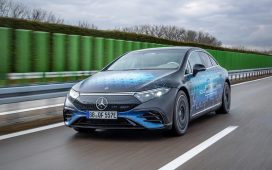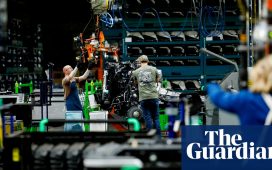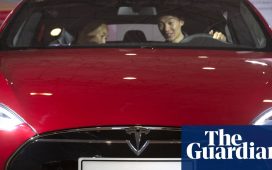The UK sold its one millionth electric car earlier this year, and January 2024 was the best launch month since the epidemic in 2020. It has taken more than 20 years for EV sales to reach the million mark, but a dearth of skilled EV technicians may be the cause of a future sales slowdown.
Lawrence Whittaker, CEO of Warrantywise, a renowned aftermarket warranty provider in the British automobile industry, has counseled the UK government to address the problem of EV technicians or else face longer repair wait times and higher repair prices, which will ultimately result in dissatisfied EV owners.
In a statement, Whittaker said: “EVs continue to grace our headlines, whether it’s a comment on the perceived lack of EV charging infrastructure, confirmation of increased road tax for EVs alongside the government-mandated ban on internal combustion engines and worries of EV-specific insurance cost increases. That’s just the tip of the iceberg as far as I can see – we’re still running head-first into one of the most concerning skills shortages we might see in the 21st century; the lack of trained TechSafe EV technicians.
“The Institute of Motor Industry (IMI) issued yet another worrying report showing that there’s still a huge skills gap of trained EV technicians, risking EV uptake and driver satisfaction. Their [IMI’s] latest EV TechSafe certification data shows only 58,800 technicians are now qualified to work on EVs, representing just 24% of the UK automotive workforce. That’s not enough when you consider that there are over 1,190,000 fully electric cars on UK roads. However, based on the forecast increase in EVs on UK roads, the IMI is currently predicting a shortfall of 3,000 technicians by 2031. The gap is expected to reach 16,000 by 2035 according to this most recent report. Moreover, it’s not just the lack of technicians, but where they’re located in the UK, that seems to be the new concern.
“Without enough qualified TechSafe EV technicians, I believe the rapid adoption of electric vehicles could stall, leading to safety risks, delayed repairs, and stunted growth in the EV industry. As demand for electric vehicles surges, the pressure on the industry to train and certify technicians is mounting, making this shortage a critical bottleneck that could undermine the transition to greener transportation. That sounds severe, but as our maintenance option for internal combustion engine vehicles continues with our plans for vehicles up to 15 years old, and older with our classic car plans, our aim is to always provide the best levels of service for all our customers. This is why I continue to highlight the issue with EV technicians and emphasise the need to focus on our EV ecosystem.
“The implications of this skills shortage extend far beyond just vehicle maintenance. As EVs become more complex, with advanced software, battery systems, and high-voltage components, the expertise required to service and repair them goes beyond what traditional automotive technicians are trained to handle, hence having to go through a stand-alone TechSafe training.
“As I reflect on this, from a Warrantywise business perspective, keeping in mind the need to provide a seamless repair system for our customers, I’m concerned about potential delays and increased repair costs. With high demand and a limited supply of these skills, repair services for EVs are likely to be more expensive and take longer to complete, especially compared to those for petrol or diesel cars, due to the shortage of trained technicians.
“As we [Warrantywise] provide warranty cover on all [EV, hybrid, petrol and diesel] used vehicles, which will continue beyond 2040, it’s crucial to ensure we maintain the same level of service and maintenance for all our customers, regardless of how the vehicle is powered [EV, hybrid, petrol and diesel]. I’m also concerned that the shortage of TechSafe EV technicians could hinder the adoption of electric vehicles. If this issue persists, we could see a slowdown brand new EV purchases after the current UK 2030 ICE ban. To that end, it’s essential for governments and industry leaders to recognise that investing in a skilled workforce is as important as investing in the infrastructure needed to support electric vehicles. Without a well-prepared workforce, even the most ambitious EV adoption plans could stall.
“To address this looming crisis, a coordinated effort is required. Educational institutions, automotive companies, and governments must collaborate to develop and fund programmes that can quickly train a new generation of EV technicians. This includes updating the curriculum to include the latest EV technologies, providing incentives for students to pursue careers in this field, and ensuring that current technicians have access to upskilling opportunities. Only by taking proactive steps now can we hope to build a robust and sustainable support system for the electric vehicle revolution. That extends far beyond just upfront EV pricing and charging, and into investment into a skilled workforce to service and maintain them for the future. The industry relies on us having TechSafe technicians, now and into the next phase of EV sales.”











